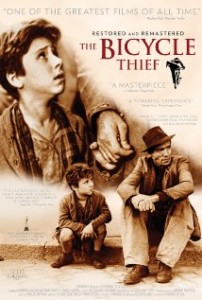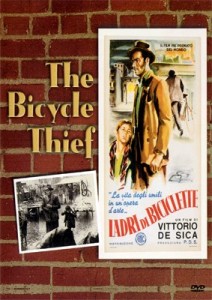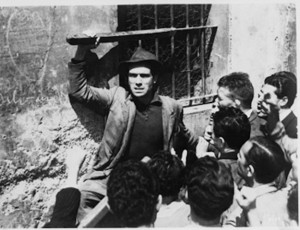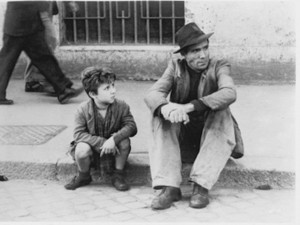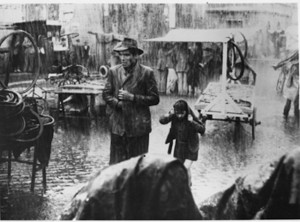Bicycle Thieves [Ladri di Biciclette] ***** (1948, Lamberto Maggiorani, Enzo Staiola, Lianella Carell) – Classic Movie Review 1046
Director Vittorio De Sica’s revered Italian classic of neo-realist cinema about a poor, unemployed Roman man (Lamberto Maggiorani) and his precious bike was voted the most outstanding foreign language film at the 1950 Oscars. It won the Golden Globe as Best Foreign Film and the BAFTA Film Award as Best Film from any Source.
At last he gets a good job. But then the bicycle he must have for his newly found work hanging up posters is stolen. So the understandably glum and morose father hero Antonio Ricci and his eager little son Bruno (Enzo Staiola) spend the day walk the streets of Rome desperately hunting for it. Ricci finally manages to locate the thief but he has no proof the bike is his. Without a bike, Ricci can’t keep his job and will find it near impossible to find another in Italy’s depressed post-World War Two economy.
De Sica’s film wears its big heart on its sleeve. It’s warm, simple, moving and generous-spirited, but as well as that it is burning inside with the urgent political statement and social message its story implies. Bicycle Thieves’s neo-realist cinema style makes it look casually thrown together, with its entire cast of non-professional actors and its filming on actual Rome locations.
But in fact it’s a highly professional, strongly motivated, carefully-written film, with a finely honed Oscar-nominated screenplay by Cesare Zavattini and minutely studied, painstaking direction by a fired-up De Sica.
Bicycle Thieves has kept its reputation intact over the years. It is always respected and often on all-time top 10s, even though the neo-realist cinema movement and De Sica have long been overshadowed and out of fashion. In 1952 it was voted greatest film of all time in Sight & Sound’s poll of filmmakers and critics. And now De Sica’s masterpiece is restored and remastered and looks perfect again.
In real life Maggiorani was a factory fitter who struggled to find work after filming. The boy was a child De Sica spotted in the crowd watching the filming. He said he chose them for their way of walking. Lead actress Lianella Carell (as the mother Maria Ricci) was a journalist who had approached him for an interview.
Film director Sergio Leone worked as an assistant and has a cameo as one of the priests during the rainstorm.
At one point David O. Selznick was to produce and proposed casting Cary Grant as the lead. Instead, De Sica requested Henry Fonda, before deciding to cast all amateur actors.
In American, Sweden and elsewhere the title became The Bicycle Thief (Cykeltjuven).
© Derek Winnert 2014 Classic Movie Review 1046
Check out more reviews on http://derekwinnert.com

